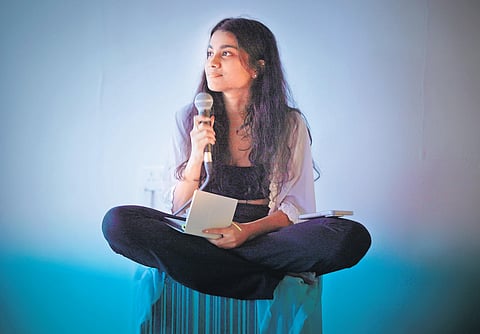

KOCHI: “Though there are torturers in the world, there are also musicians,” poet Michael Coady once wrote. Musicians have the remarkable ability to transport us to a realm of sublime pleasure, tapping into our innermost memories that words cannot express. Music’s capacity to evoke euphoria and enrich us spiritually is well-known.
Of late, researchers have been exploring the effects of blending music with meditation to enhance cognitive wellness, and early findings suggest it can help one achieve a profound sense of spiritual connection and emotional release.
Chai Lenin, an Indian-origin Singaporean, who is currently a medical researcher, has harvested the potential of music in her work. Her trilingual music – incorporating Malayalam, Tamil, and English – is a heady blend of Carnatic ragas and electronic music riffs.
She recently hosted a “transformative session” featuring musical trance and meditation at Cafe Papaya in Kochi. Drawing on the ancient wisdom of Carnatic music, the session aimed to foster a spiritual connection between the mind, body, and earth.
The event was also a celebration of Chai’s first single, ‘Rebirth’, which has been well-received in music circles. The song’s blend of traditional and modern elements mirrors the personal journey of 24-year-old Chaitanyasre.
Growing up in a family that runs a Carnatic music school in Singapore, Chai was immersed in this musical world from a young age. “I would listen in on classes my father taught and learn from them,” she recalls.
“The exposure to Carnatic music was pivotal to shaping me. As I came of age, my father suggested I do an arangetram (stage debut). That made me realise how much I loved sharing and participating in music.”
As she matured, Chai’s musical horizons expanded to encompass electronic and pop sounds, too. During this period, she questioned the rigid conventions of Carnatic music and explored how it could become a medium for personal liberation and experimentation.
Music evolved into a deeply spiritual and philosophical practice for her. This essence was palpable through the session that was structured as a guided meditation interspersed with ragas rendered by Chai.But, why such an intense session at a cafe? “I wanted the session to be a place where anyone can join and explore themselves, the people around them, and, of course, the ragas and how they relate to our lives,” she says. “I always hope people are able to access a higher state of awareness through music.”
Chai’s experiments were not mere random brainwaves. “My academic training, in both philosophy and pre-medicine, led me to contemplate how the constant reports of emotional unwellness in society stem from spiritual deprivation,” she says.“My scientific background made me look at the potential of tapping into different aspects of how the brain responds to music and meditation.”
The idea of using music to calm the nervous system motivated her. “My focus has been on activating the parasympathetic nervous system, associated with rest and relaxation, and being able to reset cortisol levels that are linked to stress,” explains Chai, who is preparing for MD.
“For me, music has been a way of finding stillness and grounding. Carnatic music contains profound wisdom, associated with different moods, emotions, and sensations that enable you to restore your equilibrium baseline and feel more relaxed, rejuvenated.”